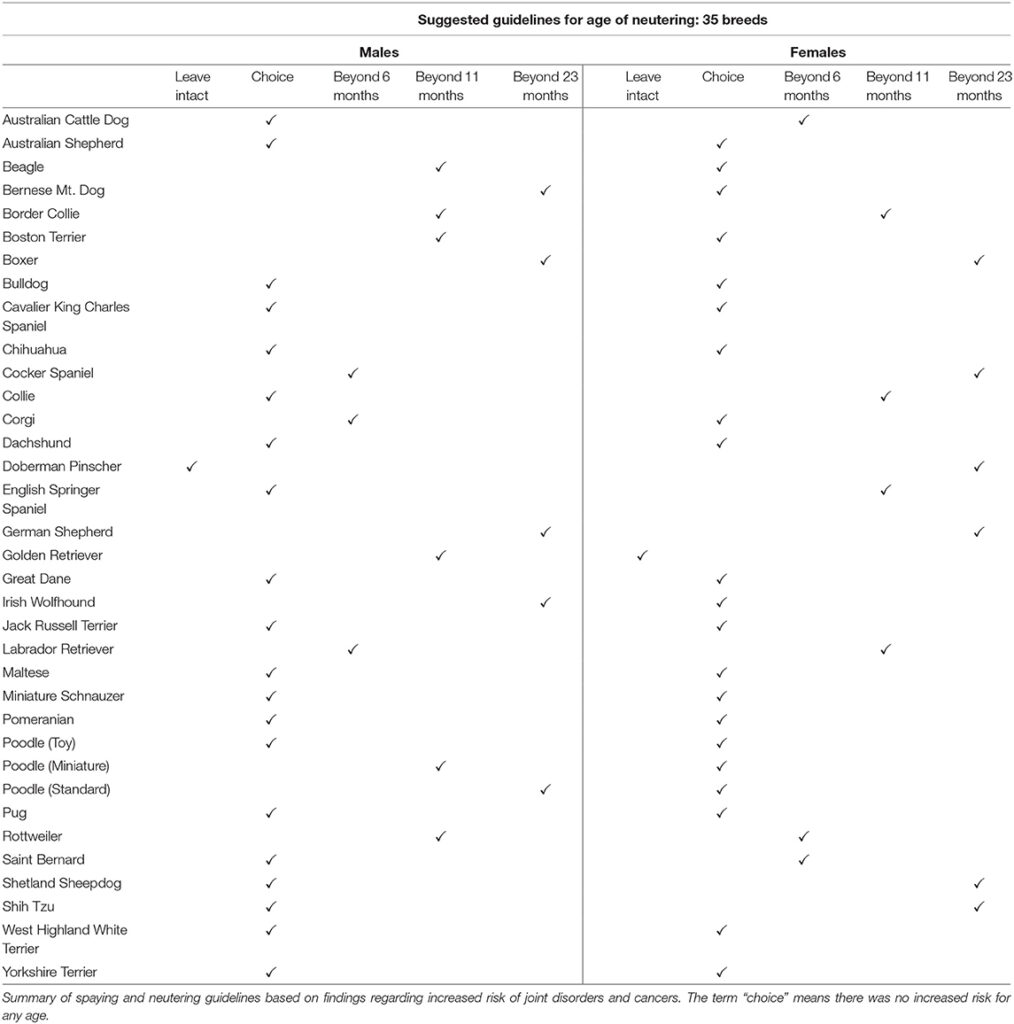Let me start by saying that there is no right or wrong answer, but there certainly are a few fairy tales out there and new information constantly coming to light. Curiously breed and size both play an important part in decision making as to the timing of desexing.
There are several considerations around development of medical and behavioural issues with regard to early desexing, desexing at around puberty, delayed desexing and leaving animals entire.
So, let’s have a look at them one at a time.
All of the facts below are based on credible peer reviewed studies with the most recent being published 07/07/2020 and not the personal opinions or observations of the general public, Facebook users or even mine.
Behaviour:
Separation anxiety, escaping and inappropriate elimination were all decreased in those male and female dogs desexed early (6w-12m). In a 15-month study where a sample of dogs were desexed at 7 weeks, 7 months and the remainder left intact investigated excitation, barking, playfulness, aggression towards other dogs, affection toward people and outgoing nature. The study concluded that there was no difference in the desexed groups, with an increase in barking and inter-dog aggression in intact individuals of both sexes. Interestingly, in dogs trained for disability service, those dogs desexed earlier had higher success rates indicating they may be better able to focus on training. The single biggest impact on positive behaviours is critical socialisation undertaken between 3 and 17 weeks of age, most importantly remaining with the litter mates until 8-12 weeks of age. I will say however, once entire dogs reach puberty, any hormonal behaviours become established and although they can be reduced with desexing, they never disappear. Delays in castrating your male dog will mean he learns to cock his leg and the outdoor furniture may never be safe again. So, the decision is a balancing act between desired behavioural traits and physical development.
Musculoskeletal development:
The onset of puberty leads to closure of the growth plates. Contrary to popular opinion, desexing does NOT stunt the growth of an animal, in fact it prolongs it. Growth plates are present at each ends of the bones and are the area of the bone that allows it to grow during development. These areas stop becoming active with the onset of puberty and the development of sex hormones. Neutering means the animal does not develop those gonadal hormones and so the long bones grow slightly longer, in other words your dog will be slightly taller, if you desex early. There is now some evidence to suggest that there is a risk of developing some musculoskeletal problems with early desexing, such as long bone fractures, hip dysplasia, decreased muscle mass, or angular limb deformities, but this varies significantly between breeds. There has been ONE older study that concluded neutered animals in general were at greater risk of cruciate disease when compared to entire animals. I personally have noted that these animals tend to have longer straighter hind legs which could change the pressures on the knees and increase the risk of cruciate injury as it changes the angle of the top of the tibia (shin bone) and the direction of pressure on the joint. It is important to remember that Hip Dysplasia is a multifactorial condition, with multiple genes, environmental, dietary, exercise and body score (obesity) factors all contributing, so solely labelling early desexing as the cause would be irresponsible. with all of the studies investigators looked (after the fact) at the age at which the dogs were desexed and the occurrence of problems. Earlier studies look only at smaller often related breed groups.
Obesity:
Again, this is not a simple issue; genetics, diet and activity level all play a part. What might surprise you is that dogs that are desexed earlier are LESS likely to have obesity related issues – bet you didn’t see that one coming! Feeding your dog correctly with a diet well balanced in Protein, Fats and Carbs and getting out there and being active is the best way of avoiding weight related issues and not what age your dog is when it’s desexed. My belief is that puppies need to be vaccinated, neutered and played with lots, however too often owners get bored and just want their pet to sit next to them on the couch and not chew up their stuff… and then the waistlines of both parties grow!
Reproductive diseases and cancers:
Entire males are at risk of prostate cancer, prostatitis, prostatic abscesses, testicular cancers and anal adenomas/adenocarcinomas. Many of these conditions can turn out to be fatal and are often quite expensive to diagnose and to treat in the process.
Entire females are at risk of breast cancer, uterine cancer, ovarian cancer, infected uterus (pyometra), phantom pregnancies and unwanted pregnancies. Pyometra involves a hormonal imbalance after a season leading to a uterus full of infection; this can happen with the first season or any one after that and can be fatal even after treatment due to the toxic effect that is has on the body. Don’t be surprised if you end up with a vet bill that could feed a small country – the amount of work behind the scenes that goes into trying to save one of these bitches is enormous, and although the surgery is often successful, the strain that the disease puts on the body occasionally leads to death in the days to weeks following.
Urinary Incontinence:
Both male and female dogs can suffer from hormonal incontinence. Age at desexing had no impact on males and as they age hormonal incontinence can occur in both desexed and intact males.
In females there was evidence in only one study that early desexing (less than 3 months of age) increases the risk of urinary incontinence. There is no scientific evidence to support the commonly held opinion that letting the bitch have one season had any impact on urinary incontinence, however it did significantly increase the risks associated with the surgical spey procedure itself. Spey should be delayed where the bitch has juvenile vaginitis, infantile vulva or if urinary incontinence is already present and your vet is best to advise on these conditions.
There is no benefit in letting your male “have one roll in the hay before he loses his manhood”, that’s your anatomy talking fellas. There is no benefit in letting any bitch that you are not planning on breeding with have a season in most cases (with a couple of exceptions I will mention shortly), as any hormonal exposure increases her cancer risk. Letting her have one litter can increase resource guarding and anxiety issues along with cancer risks. You should never take a bitch out hunting when in season, it’s just about guaranteed she will find the mankiest, feral male dog going and end up pregnant and better still, she will probably have a dozen pups!
Benefits:
Apart from all of the obvious ones mentioned above, there are a couple of benefits that are gained if your dog is desexed early.
- smaller animal = less anaesthetic agents = greater drug safety
- smaller tissues and less developed blood vessels = smaller wound and better recovery
- less age, less hormonal experiences = less hormonal based behaviours
- less drugs, quicker surgery, less complications = less expensive
A list will follow in the breeds investigated as part of the most recent study as to the most appropriate age for desexing. Other than for breeding, there is NO benefit in leaving your dog entire. There is however increased risk of disease, behavioural problems and injury (when they run amok chasing their next girlfriend, for example!). Did you know that more than 75% of cats hit by cars are entire males!
Image courtesy of: https://www.frontiersin.org/files/Articles/548304/fvets-07-00388-HTML-r1/image_m/fvets-07-00388-t001.jpg
Take a deep breath, be brave, uncross your legs as they are not your bits that the vet is removing (also makes it easier to drive) and pay a visit to your vet. Fellas if you really are desperate for your fella to keep the family jewels, then consider a hormone implant to chemically neuter them – it will last 12-18 months, and you can breathe a sigh of relief.
Direct Vet Services is a proud advocate for safe spaying and castration practices and is offering a special low price for all Wyndham residents for the month of September 2020! Wyndham residents can receive free council registration and a $50 rebate as long as your pet is microchipped! NOTE They must be microchipped in order to qualify for FREE council registration and the rebates where applicable for Wyndham Residents.
Your quoting process will vary depending on the size, weight and health requirements of your pet. For an accurate quote and to discuss your pet’s needs and the level of care required during desexing, please call (03) 9369 1822 for your personalised fee and appointment booking.
*Please note that availability is STRICTLY limited and has previously booked out early, so get in quick to secure your savings.



